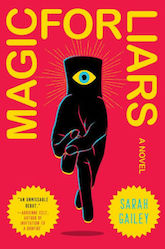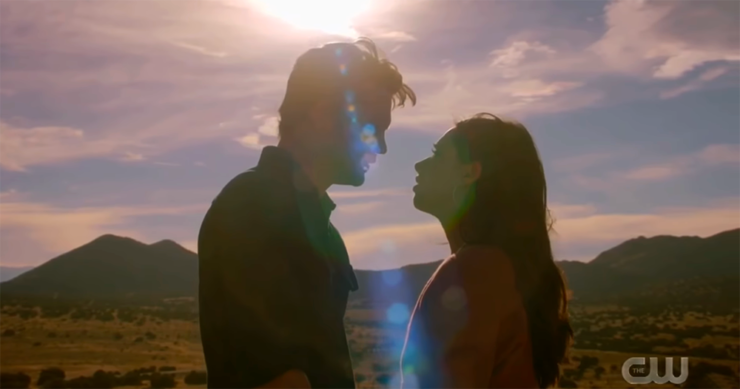Hot take: Roswell, New Mexico is the greatest show ever made. I’m in love with everything about it. It’s absolutely perfect even when it kinda sucks, and I need a dozen seasons please and thank you.
The basic premise of this series is loosely based on the Roswell High books by Melinda Metz, but like the original Roswell television show, Roswell, New Mexico establishes itself early on as its own unique thing. Liz Ortecho (Jeanine Mason) returns to her hometown a decade after her troubled sister Rosa (Amber Midthunder) killed herself and two other girls in a drunken car wreck. The town never forgave the Ortechos—a lesson Liz learns the hard way when an angry bigot shoots up her father’s alien-themed diner. Liz is caught in the crossfire but is saved by Max Evans (Nathan Parsons), former high school friend and current hunky sheriff’s deputy and secret alien. Max, his sister Isobel (Lily Cowles), and their friend Michael (Michael Vlamis) landed in 1947 but remained trapped in pods until 1997, when they were found wandering the desert. Discovering that aliens exist is hard enough, but learning they may have been involved in Rosa’s death is too much for Liz to bear.
As the mystery of what really happened to Rosa gets more convoluted and sprawling, Liz finds it harder and harder to leave town. Meanwhile, Michael and Alex Manes (Tyler Blackburn) can’t keep their hands off each other; Liz’s former best friend Maria DeLuca (Heather Hemmens) is desperately trying to protect her mentally fragile mother; sheriff’s son Kyle Valenti (Michael Trevino) and deputy Jenna Cameron (Riley Voelkel) get dragged into a conspiracy they can’t get out of; and two Big Bads compete for dominance.
I loved the original Roswell. Of course I did—like the characters, I was also a high school student in a smallish suburb famous for one very specific thing but where not much ever actually happened. The acting left much to be desired—although during a recent rewatch I was blown away by how talented Shiri Appleby is—but that’s par for the course on most young adult dramas. But I adored the insta-love and crushing heartbreak and melodramatic tension between teen sexy aliens and quirky humans. Overcoming nostalgia for childhood obsessions can be a steep hill to climb for remakes, and I approached Roswell, New Mexico with a mix of trepidation and annoyance. And then I finished the first episode and immediately went back and watched it again.
Now, since I’m a ’90s kid, the easiest way to get me to love something is by slathering it in ’90s music. Much to the chagrin of the dudes in front of me, I sang out loud to every song during Captain Marvel and literally cheered when “I’m Just a Girl” came on. Roswell, New Mexico knows just how to play with my emotions by titling episodes after ’90s pop music and constructing entire episodes around said songs. I kid you not, “Mrs. Potter’s Lullaby” by Counting Crows features prominently in an early episode. Very prominently. And yet somehow it works.
Buy the Book


Magic for Liars
Roswell, New Mexico isn’t high art or prestige TV, but it is deeper than most young adult-focused prime time dramas. A single episode contains enough plot to fuel an entire season—especially that bonkers finale—and there’s plenty of beefcake, slow-burn romance, and ludicrous storylines to go around. But between all that there exists a surprising amount of nuance. With every opportunity to fall back on lazy stereotypes or overused tropes, the show always veers toward something more interesting.
Comparing aliens to immigrants would be going for relatively low-hanging fruit, but the show aims for something more meaningful. The alien trio are all white, but the space-aliens-as-immigrants metaphor gets complicated as the show leans into the American southwest location by prominently featuring Latinx characters (American-born citizens and undocumented immigrants alike) and immigration issues. Max and Isobel have assimilated into American society by avoiding using their powers and taking roles in the community that demonstrate their social ties—Max as a sheriff’s deputy and Isobel as a party planner and small-town socialite. Michael, on the other hand, has acculturated rather than assimilated. He longs for the alien traditions he’s never known and collects as much of his “real” people’s artifacts as he can. He wants to be both alien and human, whereas Max and Isobel try to live as if they were only human. At least in the beginning.
The show is equally as interested in expressing and exploring queerness. Michael gets to be a bisexual cis man who enjoys sex without being reduced to a sex machine who hits on everyone and everything. His sexuality is not played for laughs or disgust. Some bad things have happened to him because he’s bi, but the responsibility rests squarely on the person who harmed him. He’s never pitied, shamed, or blamed for it. As for Alex, it’s refreshing to have a queer character who is still navigating his identity. He’s openly gay (although he cannot speak about it with his homophobic father) but isn’t sure what that means now that he’s out of the military and on his own for the first time in his life. He isn’t just “the gay character”—he is a man figuring out how to define his identity in a way that works best for him.
Not every Big Conversation the show tackles is successful, but I always appreciate the attempt. In a later episode, Max, Liz, Maria, and Michael visit a spiritual healer who relies heavily on stereotypes. She speaks in a soothing, New Age-y tone about the Sky Spirit, decorates her site with film set-esque tipis, and wears a “Native American” costume complete with fringe and turquoise beads. At first it’s disconcerting for the viewer, given how hard the series works to be respectful of other cultures, but soon we learn the healer is actually Indigenous and is intentionally playing on the stereotypes. White people, she reasons, want to exploit her culture for their own personal gain, so why not scam them out of some cash along the way? Although the attempt at critiquing colonialism is clunky (made even more so by casting a Native Hawaiian woman to play a southwest Indigenous woman), it’s rare for western television to give space to people of color and Indigenous people to do just that.
Not gonna lie: The show is pretty corny when it comes to dialogue. The writers will always choose saccharine sentiment, leaden one-liners, and uninspired statements over craft and detail, but no one goes into a CW show expecting David Milch. And yeah, while the acting has markedly improved between the premiere and finale as everyone settles into their characters, the actors aren’t going to win any Emmys for their stellar performances. But what do you want? The format is the format is the format. I came for Max and Liz gazing into each other’s eyes as the sun shines behind them, and stayed for the surprisingly critical commentary on American politics and society.
I’m officially immune to snark and sarcasm when it comes to this show: Roswell, New Mexico is fabulous and wonderful and thoroughly enjoyable and to heck with nitpicking—I’m going to go binge watch the first season for the third time in a row.
Alex Brown is a high school librarian by day, local historian by night, author and writer by passion, and an ace/aro Black woman all the time. Keep up with her on Twitter and Insta, or follow along with her reading adventures on her blog.










